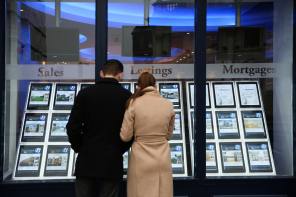

Annual house price growth has dropped on the back of prices falling sharply in August.
The latest Nationwide house price index reported August’s annual growth dropped to 2 per cent, from 2.5 per cent in July, sitting at an average house price of £214,745.
Month-on-month, the latest figures show a price decline of 0.5 per cent - the biggest monthly drop since July 2012.
Robert Gardner, chief economist at Nationwide, said despite the slight drop, annual house price growth remained within the fairly narrow range of 2-3 per cent, where it has sat over the past 12 months, suggesting the balance of supply and demand in the market remained unchanged.
He said: "Looking further ahead, much will depend on how broader economic conditions evolve, especially in the labour market, but also with respect to interest rates."
Mr Gardner said subdued economic activity and pressure on household budgets was likely to show a modest drag on price growth this year, but he expects borrowing costs to remain low.
He added: "Overall, we continue to expect house prices to rise by around 1 per cent over the course of 2018."
The index reported almost 48,000 Help-to-Buy equity loan transactions over the past 12 months to March 2018 - an increase of 21 per cent on the previous year.
The scheme accounted for 8 per cent of total residential purchase mortgages in England in the recorded period, but Mr Gardner said it was unclear how much help-to-buy activity represented additional demand and how much had replaced activity that would already have taken place.
Jonathan Samuels, chief executive at Octane Capital, said it was no major surprise that prices continued to soften in August, a traditionally quiet month with people's attention focused elsewhere.
September could see price growth turn positive again, he added. "There is a blanket of uncertainty covering the UK property market at present."
Mr Samuels said while the employment market remained strong, stubbornly high inflation, the potential for another rate rise, overstretched household finances and the growing possibility of a no-deal Brexit were seeding serious doubt in the minds of prospective buyers.
He added: "A Brexit no-deal could hit prices in the capital, especially at the higher end, like a sledgehammer."
Despite the strong Help-to-Buy figures, Mr Samuels said the strong performance may not be all good news.
He said: "You cannot help but think the government is boxing itself into a corner on Help-to-Buy.
"Help-to-Buy is certainly enabling many more people to get onto the property ladder but serious question marks remain over the longer term impact of what is an artificial stimulus."
Lucy Pendleton, founding director at James Pendleton, said with just four months left of 2018, the biggest monthly fall since the London Olympics brought prices dramatically in line with the lender’s forecast for the year.
She said: "Nationwide’s prediction of a 1 per cent increase in 2018 would mean prices finish on just over £213,000, a level not seen since April and only around £1,500 lower than current prices.
"That would undo most of the year’s gains, so if that happens, expect the slowdown to feed into the Brexit mood music as the UK careers toward an uncertain future and possible hard Brexit in early 2019.
"The stuttering performance of house prices around this level sees them repeatedly do battle with the inflation figure - having pipped inflation to the post in July, it is now almost certain house prices have been washed over by CPI once again in August."
rachel.addison@ft.com



